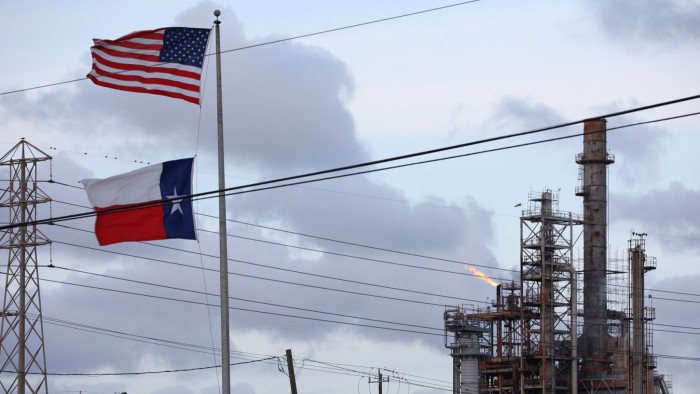Unlock the White House Watch newsletter for free
Your guide to what Trump’s second term means for Washington, business and the world
US states are sending bipartisan delegations to Brussels to seek advice on climate policy, especially carbon pricing schemes, in the face of the Trump administration’s deepening opposition to green measures.
Lawmakers from states including Washington and New York have met European Commission climate officials in recent weeks and delegates from California will visit Brussels this week, EU officials said.
The states are predominantly Democrat but the visiting lawmakers have been bipartisan, a senior EU official noted. A private sector delegation from Texas, a Republican state, was also among the visitors to the commission for discussions about renewable energy and direct air capture, another EU official said.
“There is clearly a business case for decarbonisation which can win over even Trump’s demagogy, and deep in Republican heartland,” the official said.
It marks a notable area of collaboration for certain US constituencies and the EU at a point when the relationship with the bloc is strained by President Donald Trump’s tariffs agenda and stance on Russia’s war on Ukraine.
The EU views the outreach as a key part of its efforts to promote carbon pricing worldwide. It introduced the world’s first international emissions trading system in 2005. Under the scheme, heavy polluters buy permits to cover their carbon emissions, in effect setting a carbon price.
The bloc will also enforce a carbon border tax, putting a levy on the carbon intensity of imports in specific sectors including steel, from next year.
Kurt Vandenberghe, director-general of climate in the European Commission, told a recent gathering that the so-called carbon border adjustment mechanism was prompting “a growing interest in carbon pricing throughout the world”.
China has put in place a plan to expand its emissions trading scheme this year to cover polluting sectors such as steel and cement, and Japan is due to put its scheme into force next year. Brazil adopted an emissions cap-and-trade system last year that will come into effect in 2029.
States in north-east US along with Oregon and Washington have either recently introduced, or are in the process of introducing, their own schemes.
John Podesta, the top US climate official in the Biden administration who championed a carbon price on imports, recently told the Financial Times that many states were becoming more vocal about the need for continued climate action in the face of concerted Trump-era rollbacks on green policy.
“You’ve seen more serious pushback [from governors] in Democratic states, but you’ve also seen some grousing from Republican governors who don’t want to see these investment losses,” he told the FT Climate and Impact Summit.
Climate-focused governors and mayors have come together as part of America Is All In, a coalition aimed at cutting emissions in half by 2030, whose tagline is “America is all in to achieve the goals of the Paris Agreement”.
Governor JB Pritzker of Illinois and Mayor Justin Bibb of Cleveland are among the leading figures who have spoken out about how cities and states would defend climate action.
California governor Gavin Newsom, who has long pushed policies on air quality, fuel standards and emissions regimes, is in a legal battle with the Trump administration over a proposed state ban on petrol car sales.
“We will not back down from our commitment to delivering on our climate goals that make our communities healthier and more prosperous,” Newsom said in a recent statement on behalf of America Is All In.
Climate Capital
Where climate change meets business, markets and politics. Explore the FT’s coverage here.
Are you curious about the FT’s environmental sustainability commitments? Find out more about our science-based targets here
